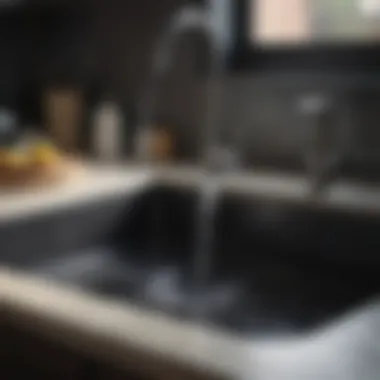Understanding Black Water in Kitchen Sinks: Causes & Solutions


Intro
The occurrence of black water in kitchen sinks presents a significant challenge for homeowners. This issue is not merely aesthetic; it poses real health risks and signifies underlying plumbing problems that demand timely and effective intervention. Understanding the reasons behind black water emergence and the appropriate methods for resolution is vital in maintaining a safe and hygienic home environment.
The complexities surrounding black water extend beyond its unpleasant appearance. Various factors contribute to this situation, including clogged pipes, contaminated water sources, and deteriorating plumbing. Each cause carries with it potential health risks that households must consider. Prompt identification and appropriate remedial measures are crucial for addressing these issues effectively.
In this article, we will systematically explore these causes, delve into potential health implications, and provide practical solutions to ensure kitchen sinks remain a source of cleanliness rather than a health hazard. Through this guide, readers can gain clarity on what black water signifies and how to act decisively when faced with such plumbing complications.
Intro to Black Water Issues
Dealing with black water issues is not just an inconvenience; it can pose serious risks to health and property. Understanding this phenomenon, especially in kitchen sinks, helps homeowners act decisively when such problems arise. The focus on black water stems from its implications for sanitation and the potential for costly repairs if left unchecked. This section introduces the topic of black water, setting the stage for further exploration of its causes, health risks, and solutions.
Defining Black Water
Black water refers specifically to wastewater that contains human waste, detergents, food particles, and other hazardous substances. Unlike grey water, which comes from sinks and showers without bodily waste, black water poses a greater health risk. This distinction is essential to recognize since black water can lead to contamination. Knowledge of what constitutes black water is vital for proper management and response.
Common Signs of Black Water
Identifying black water issues early can save significant trouble. The common signs include:
- Dark discoloration in the water.
- Unpleasant odors emanating from the sink.
- Slow drainage, which may signify a blockage.
- Frequent backflow events, where waste rises up from pipes.
These indicators often suggest a need for immediate attention. Ignoring these signs can lead to worsening situations that not only compromise usability but also health.
Causes of Black Water in Kitchen Sinks
Understanding the causes of black water in kitchen sinks is essential for homeowners who wish to maintain a safe and clean environment. Black water is often an indication of serious plumbing issues that can lead to health risks and significant property damage if not addressed promptly. Identifying the precise cause allows for efficient solutions, thus minimizing the potential for inconvenience and expense.
Clogged Pipes and Drains
Clogged pipes and drains are among the most common contributors to black water issues. When food particles, grease, and other debris accumulate in the plumbing, they block the flow of water. This obstruction can lead to stagnant water, which may eventually harbor bacteria and produce foul odors.
- Grease buildup is particularly troublesome. It can harden over time, forming a clog that traps organic matter.
- Regular cleaning and the use of drain strainers can significantly reduce the incidence of clogs.
Maintenance strategies should include flushing the drains with hot water and baking soda or using appropriate drain cleaners periodically. This can help dislodge minor obstructions before they become severe.
Backflow from Sewage Systems
Backflow from sewage systems poses a serious health risk. When the sewage system becomes overwhelmed or malfunctioning, wastewater can flow back into your home’s plumbing. This scenario can lead to black water emerging from your kitchen sink.


- Improperly installed or damaged sewer lines can increase the risk of such backflow incidents.
- Installing backflow valves can be a preventative measure. These valves ensure that wastewater does not re-enter your home from external sources.
Awareness of local plumbing regulations can provide additional insight into proper sewage management practices. Ensuring your plumbing system complies reduces the risk of future problems.
Insufficient Ventilation
Insufficient ventilation can contribute to the development of black water in kitchen sinks, often indirectly. When plumbing systems lack proper venting, gases can build up inside pipes, leading to pressure changes that may force water back into the sink.
- Vent pipes that are blocked or improperly installed can create hazardous conditions.
- Inspecting these vent systems should be part of regular plumbing maintenance.
Understanding ventilation in plumbing helps in ensuring healthy indoor air quality and preventing pressure-related plumbing issues.
By identifying and documenting these common causes, homeowners can better prepare for treatments and preventive actions, leading to a healthier living environment.
Health Risks Associated with Black Water
Addressing health risks connected to black water is essential in any discussion about this problem. Black water is more than an unsightly issue; it poses significant health concerns that can affect all members of a household. Understanding the specific risks involved can motivate homeowners to address black water problems immediately, minimizing risks to their health and well-being.
The two major health risks associated with black water are bacterial contamination and the effects on indoor air quality, both of which can lead to serious health issues if not mitigated early.
Bacterial Contamination
Bacterial contamination from black water can lead to various illnesses. One of the most relevant bacteria that can thrive in contaminated water is E. coli. This bacterium is commonly associated with food poisoning and can lead to severe gastrointestinal distress. The presence of E. coli in black water highlights the health risk it poses. In kitchens, where hygiene is paramount, the risk of contamination increases drastically, especially if food preparation areas are exposed to this water.
- E. coli Risks: The key characteristic of E. coli risks is its ability to survive in contaminated environments. In the context of black water, this bacterium signifies immediate danger. This article emphasizes these risks because understanding them can lead to preventive measures. The unique feature of E. coli is its impact on human health, with symptoms ranging from mild abdominal pain to severe complications requiring hospitalization. Its prevalence in black water makes it a significant concern in domestic environments, making awareness critical. Homeowners must recognize the imperative of managing water contamination to avoid E. coli related health problems.
- Salmonella Concerns: Another notable bacteria associated with black water is Salmonella. This bacterium can cause serious foodborne illness, affecting many individuals each year. Salmonella thrives in dirty water and sewage, which can backflow into kitchen sinks. Its key characteristic is the potential for rapid spread through contaminated food or surfaces. As this article introduces the concerns related to Salmonella, it elucidates the need for proper sanitation and prompt removal of black water. Its unique feature lies in its high infectivity rate, which can lead to outbreaks, especially in households with children or immunocompromised individuals. The implications of Salmonella in relation to black water emphasize the need for vigilance and action to protect one's health.
Odor and Indoor Air Quality
Odor is another significant health risk associated with black water. The foul smells emanating from contaminated sources can disrupt indoor air quality. Persistent odors from black water can induce nausea and headaches, affecting overall comfort at home. Additionally, volatile organic compounds, or VOCs, can also be present in black water, leading to respiratory issues and further degradation of indoor air quality.
Families experiencing consistent unpleasant smells should recognize this as an indicator of underlying problems. The presence of these odors suggests escalation of contamination, requiring immediate attention to prevent more severe health implications.
The risks associated with black water extend beyond hygiene; they encompass structural and environmental concerns that must be addressed to ensure a healthy living space for family members.
Immediate Actions to Take
Immediate actions are crucial when dealing with black water in kitchen sinks. Promptly addressing the issue can minimize health risks and damage to property. Knowing what steps to take can help homeowners regain control of their environment quickly and effectively.
Identifying the Source


The first step in managing black water issues is to identify the source of the problem. This can involve a systematic approach:
- Observe and Assess: Take note of when black water appears. Is it a response to certain activities, such as running the faucet or using the dishwasher? Understanding the pattern can help pinpoint the issue.
- Check for Blockages: Inspect the drain for visible clogs. Food waste or grease buildup often results in black water. Remove any debris if possible. Use a flashlight to look deeper into the drain for signs of blockage.
- Consider Whole System Issues: Sometimes, black water may be a symptom of a larger plumbing issue, such as backflow from the sewage system. Check outside to see if nearby drains are also affected. If multiple outlets are showing similar problems, it can indicate a more significant issue that needs addressing.
- Monitor for Odors: A foul smell is often associated with black water. Pay attention to any unusual odors that may arise from the sink area. This can provide clues about what might be occurring within the plumbing system.
Identifying the source not only helps in addressing the issue but also provides essential information if professional assistance is required later.
Stopping Water Flow
Once you have identified the source, the next immediate action is to stop any further water flow. This prevents the situation from escalating. Here's how you can proceed:
- Turn Off the Water Supply: Locate the water shut-off valve under the sink. Turn it clockwise to stop the inflow of water. If you are unsure where this is located, check your home’s plumbing schematic or consult with a professional.
- Avoid Using Appliances: Refrain from using any kitchen appliances, such as dishwashers or garbage disposals, until the issue is resolved. Engaging these systems can exacerbate the backflow issue.
- Contain Any Leaks: If water is present, use buckets or towels to collect and manage it. This can help in reducing water damage and making the following steps more manageable.
- Inform Family Members: Let everyone in the household know not to use the kitchen sink until the problem has been resolved. This can prevent additional complications from arising.
By taking these immediate actions, you ensure safety and limit the potential for further complications related to black water. It's a vital step to protect both your health and your home.
Preventive Measures to Avoid Black Water Issues
Preventing black water issues in kitchen sinks is critical for maintaining a healthy home. By taking proactive steps, homeowners can significantly reduce the risk of black water emergence. Not only does a clean and functional plumbing system contribute to overall hygiene, but it also fosters a comfortable living environment. Understanding the significance of prevention allows individuals to stay ahead of potential problems.
Regular Maintenance Checks
Scheduled Plumbing Inspections
Scheduled plumbing inspections serve as a vital component in avoiding black water issues. Homeowners should consider this practice an essential part of their maintenance strategy. Regular inspections help identify problems before they escalate into major concerns. A key characteristic of these inspections is their systematic approach; professionals check for leaks, clogs, and other potential sources of black water.
These inspections are a beneficial choice. They provide peace of mind and can save money in the long run by reducing the likelihood of severe issues. One unique feature is the professional experience these inspectors bring. They often recognize warning signs that individuals may overlook. This proactive measure can avert unexpected plumbing emergencies, maintaining both the safety and integrity of the home.
Drain Cleaning Regimen
Implementing a drain cleaning regimen is another important preventive measure against black water. This practice helps ensure that drains remain clear and functional, preventing buildup that may lead to clogs. One significant aspect of a drain cleaning regimen is its consistency. Regular, scheduled cleanings can eliminate debris before it causes serious blockages.
This method is popular among homeowners as it is straightforward to execute. Utilizing commercial or homemade cleaning solutions can enhance the regimen's effectiveness. A unique feature is that it empowers homeowners to take control of their plumbing maintenance. However, it is important to note that overuse of harsh chemicals can damage pipes over time. A balanced approach is necessary for optimal results.
Proper Disposal of Kitchen Waste
Proper disposal of kitchen waste is essential to minimize black water risks. Adhering to specific guidelines on how to handle food scraps and grease can reduce plumbing issues. Food waste should ideally be composted or placed in a trash bin rather than sent down the sink. Additionally, keeping grease out of the drain is crucial; it can solidify and cause severe clogs.
Following these guidelines fosters a cleaner kitchen environment and guards against plumbing anomalies. By understanding the importance of waste disposal, homeowners contribute directly to smoother plumbing operations.
Professional Solutions for Ongoing Problems


Addressing black water issues in kitchen sinks requires not only immediate action but also professional solutions. These often involve consultation with trained specialists like plumbers, ensuring that underlying problems are diagnosed accurately. Homeowners should recognize that some plumbing issues exceed their capabilities. Engaging professionals can save time and prevent further complications.
When to Call a Plumber
It is critical to know when to seek help from a professional plumber. Signs indicate that intervention is necessary. For example, if black water appears consistently despite cleaning efforts or if the odor intensifies, these conditions are red flags. Slow drainage or water pooling can also signal deeper issues within the plumbing system. These symptoms suggest that the problem is not trivial and requires expertise.
Plumbers possess the necessary tools and knowledge to tackle complex plumbing systems. For instance, they can employ advanced diagnostic techniques. These methods can identify clogs or leaks that are not visible to the naked eye. Vast experience allows them to avoid time-consuming trial and error that homeowners may encounter.
Potential Plumbing Repairs
Pipe Replacement
Pipe replacement is a significant aspect of addressing black water issues. Over time, pipes can corrode or develop leaks, contributing to contamination. Replacing damaged pipes not only resolves existing problems but also prevents future occurrences. One key characteristic of pipe replacement is the implementation of modern materials, such as PVC or PEX. These materials offer durability and resistance to corrosion.
The unique feature of pipe replacement is its long-term cost-effectiveness. Although the initial investment might be substantial, eliminating the need for frequent repairs over time makes it a beneficial choice. Homeowners benefit from a more reliable plumbing system, which reduces concerns about black water.
Advantages of pipe replacement include improved water quality and peace of mind. However, disadvantages might include disruption during installation and higher upfront costs. Despite these drawbacks, the benefits often outweigh the negatives, making it a popular solution.
Sewage Backflow Prevention
Sewage backflow prevention stands as another important plumbing repair. This system prevents sewage from flowing back into the home, which can cause hazardous black water issues. The key characteristic of sewage backflow prevention is its ability to safeguard household plumbing from contamination.
The unique feature of this system is its installation of backflow valves. These valves ensure that water only flows in one direction. Their effectiveness becomes especially crucial in areas prone to flooding or heavy rains.
In terms of advantages, sewage backflow prevention can significantly reduce health risks and unpleasant odors from unintentional contamination. However, they can also require routine maintenance to ensure functionality. Therefore, homeowners must balance the initial costs and maintenance needs against the long-term safety they provide.
"Effective plumbing solutions can mean the difference between a safe home environment and one that poses health risks."
These professional solutions are essential for understanding and resolving ongoing black water problems in kitchen sinks. They represent investments into future home safety and comfort.
Culmination
Understanding the complexities surrounding black water issues in kitchen sinks is essential for maintaining a healthy home environment. This article has discussed various aspects, including the causes, health risks, and effective measures to mitigate these problems. Black water can stem from sources like clogged pipes and sewage backflow, posing significant health risks. Addressing these issues not only protects your health but also maintains the integrity of your plumbing system.
Summary of Key Points
- Definition of Black Water: Black water refers to wastewater that contains human waste, food residues, and other contaminants.
- Common Causes: Key causes include clogged pipes, sewage system backflow, and insufficient ventilation that prevents odors from dissipating.
- Health Risks: Exposure to black water can lead to serious health issues, such as bacterial infections from pathogens like E. coli and Salmonella.
- Immediate Actions: Prompt identification of the source and stopping the water flow are crucial first steps to contain the problem.
- Preventive Measures: Regular maintenance checks and proper disposal of kitchen waste can significantly reduce the risk of black water issues.
- Professional Solutions: Knowing when to call a plumber and understanding potential plumbing repairs can save you both time and money in the long run.
Encouragement for Proactive Measures
It is advisable for homeowners to proactively address potential plumbing issues to prevent black water occurrences. Regular maintenance checks provide insights into the condition of your plumbing before issues escalate. Scheduled plumbing inspections can catch problems early, while a proper drain cleaning regimen can keep systems flowing smoothly.
Moreover, understanding how to dispose of kitchen waste properly is key. Simple habits, such as not putting grease down the sink or using strainers for food scraps, can prolong the life of your plumbing systems.
By taking these proactive steps, you can avoid the complications associated with black water and ensure a safer living environment. Ignoring early signs of plumbing trouble may lead to costly repairs and health risks that could have been avoided. Therefore, remain vigilant and prioritize these measures in your household routines.







